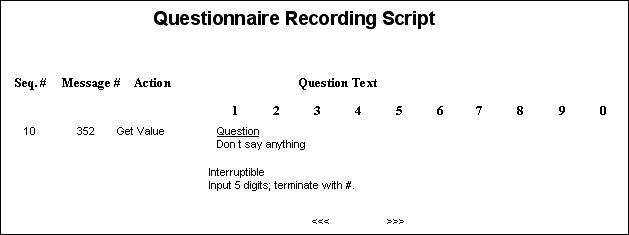IVR basics
In the IVR system, the characters * and # are special. You should check their exact meanings in your IVR documentation, but *often means repeat the last question, and # usually means that data entry is complete for the current question or field.
The IVR system refers to questions as commands. It has a number of commands, most of which have interview scripting equivalents. The ones you will need in your test questionnaire are Get Response and Get Value.
Get Response accepts a single answer in the range 0 to 9, where 1 is the lowest value and 0 represents ten. You can use it to receive single-answer categorical data from UNICOM Intelligence Interviewer - Server, when the response list contains ten or fewer responses, or to receive numeric responses in the range 0 to 9. Each answer may have logic associated with it if appropriate. Once an answer has been received for a Get Response question, the system automatically moves to the next question; there is no need to type # to indicate that data entry is complete.
Example: IVR screen of a single-response question
The following example from a questionnaire recording script shows that the fifth question in an IVR script (which is labeled 50 in IVR) is receiving a single answer from UNICOM Intelligence Interviewer - Server. The question accepts any answer in the range 0 to 9:
For further information about the contents of questionnaire recording scripts and IVR programming screens, refer to your IVR documentation.
You can pass a series of questions with single-digit responses from UNICOM Intelligence Interviewer - Server into the IVR system as a single string by copying them into a Get Value command (see below).
Get Value accepts a string of digits in the range 0 to 9. Use it when you want to pass integer responses from the UNICOM Intelligence Interviewer - Server script or to pass single-choice categorical data when the response list contains more than ten responses. The number of digits that a Get Value command accepts is controlled by the # Digits Min and Max fields. If # Digits Max is undefined or you want to accept answers with fewer than the maximum number of digits, the Terminate With # check box must be selected so that IVR terminates the data for this command when it receives a # symbol. (If you do not request a termination symbol, IVR will wait until it times out before moving to the next question. At this point, it clears the DTMF string so data for any other blank questions will be lost.)
Example: IVR recording screen for a multiple digit response
The following example from a questionnaire recording script shows that the first question in an IVR script (which is labeled 10 in IVR) is receiving the respondent serial number from UNICOM Intelligence Interviewer - Server. Up to five digits between 0 and 9 will be accepted, but since not all five values are required the string can be terminated by the # character:
If IVR receives an invalid answer to a Get Response command, it repeats the question. If it receives three invalid answers for the same question it terminates the call. With Get Value commands, if an invalid answer is given or there is too long a delay in responding, IVR repeats the question up to three times and then hangs up the call.
See also


